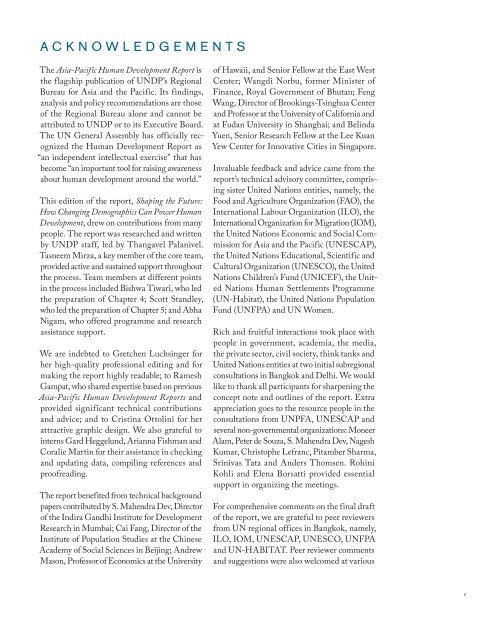SHAPING THE FUTURE HOW CHANGING DEMOGRAPHICS CAN POWER HUMAN DEVELOPMENT
1VPo4Vw
1VPo4Vw
You also want an ePaper? Increase the reach of your titles
YUMPU automatically turns print PDFs into web optimized ePapers that Google loves.
ACKNOWLEDGEMENTS<br />
The Asia-Pacific Human Development Report is<br />
the flagship publication of UNDP’s Regional<br />
Bureau for Asia and the Pacific. Its findings,<br />
analysis and policy recommendations are those<br />
of the Regional Bureau alone and cannot be<br />
attributed to UNDP or to its Executive Board.<br />
The UN General Assembly has officially recognized<br />
the Human Development Report as<br />
“an independent intellectual exercise” that has<br />
become “an important tool for raising awareness<br />
about human development around the world.”<br />
This edition of the report, Shaping the Future:<br />
How Changing Demographics Can Power Human<br />
Development, drew on contributions from many<br />
people. The report was researched and written<br />
by UNDP staff, led by Thangavel Palanivel.<br />
Tasneem Mirza, a key member of the core team,<br />
provided active and sustained support throughout<br />
the process. Team members at different points<br />
in the process included Bishwa Tiwari, who led<br />
the preparation of Chapter 4; Scott Standley,<br />
who led the preparation of Chapter 5; and Abha<br />
Nigam, who offered programme and research<br />
assistance support.<br />
We are indebted to Gretchen Luchsinger for<br />
her high-quality professional editing and for<br />
making the report highly readable; to Ramesh<br />
Gampat, who shared expertise based on previous<br />
Asia-Pacific Human Development Reports and<br />
provided significant technical contributions<br />
and advice; and to Cristina Ottolini for her<br />
attractive graphic design. We also grateful to<br />
interns Gard Heggelund, Arianna Fishman and<br />
Coralie Martin for their assistance in checking<br />
and updating data, compiling references and<br />
proofreading.<br />
The report benefited from technical background<br />
papers contributed by S. Mahendra Dev, Director<br />
of the Indira Gandhi Institute for Development<br />
Research in Mumbai; Cai Fang, Director of the<br />
Institute of Population Studies at the Chinese<br />
Academy of Social Sciences in Beijing; Andrew<br />
Mason, Professor of Economics at the University<br />
of Hawaii, and Senior Fellow at the East West<br />
Center; Wangdi Norbu, former Minister of<br />
Finance, Royal Government of Bhutan; Feng<br />
Wang, Director of Brookings-Tsinghua Center<br />
and Professor at the University of California and<br />
at Fudan University in Shanghai; and Belinda<br />
Yuen, Senior Research Fellow at the Lee Kuan<br />
Yew Center for Innovative Cities in Singapore.<br />
Invaluable feedback and advice came from the<br />
report’s technical advisory committee, comprising<br />
sister United Nations entities, namely, the<br />
Food and Agriculture Organization (FAO), the<br />
International Labour Organization (ILO), the<br />
International Organization for Migration (IOM),<br />
the United Nations Economic and Social Commission<br />
for Asia and the Pacific (UNESCAP),<br />
the United Nations Educational, Scientific and<br />
Cultural Organization (UNESCO), the United<br />
Nations Children’s Fund (UNICEF), the United<br />
Nations Human Settlements Programme<br />
(UN-Habitat), the United Nations Population<br />
Fund (UNFPA) and UN Women.<br />
Rich and fruitful interactions took place with<br />
people in government, academia, the media,<br />
the private sector, civil society, think tanks and<br />
United Nations entities at two initial subregional<br />
consultations in Bangkok and Delhi. We would<br />
like to thank all participants for sharpening the<br />
concept note and outlines of the report. Extra<br />
appreciation goes to the resource people in the<br />
consultations from UNPFA, UNESCAP and<br />
several non-governmental organizations: Moneer<br />
Alam, Peter de Souza, S. Mahendra Dev, Nagesh<br />
Kumar, Christophe Lefranc, Pitamber Sharma,<br />
Srinivas Tata and Anders Thomsen. Rohini<br />
Kohli and Elena Borsatti provided essential<br />
support in organizing the meetings.<br />
For comprehensive comments on the final draft<br />
of the report, we are grateful to peer reviewers<br />
from UN regional offices in Bangkok, namely,<br />
ILO, IOM, UNESCAP, UNESCO, UNFPA<br />
and UN-HABITAT. Peer reviewer comments<br />
and suggestions were also welcomed at various<br />
v


